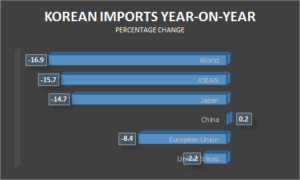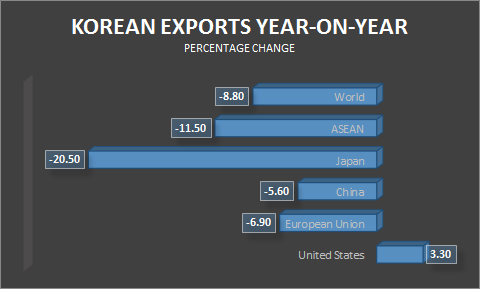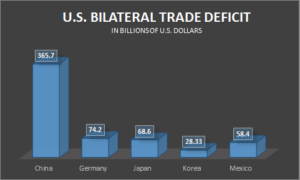The Peninsula
Global Slowdown Hits U.S.- Korea Trade in 2015

By Troy Stangarone
The United States and Korea recently released year-end merchandise trade data. With the global economy slowing as China’s economy cools, many emerging markets saw growth slow or stall, while significant drops in oil prices proved more of a drag on economic growth than expected. As a result, both the United States and South Korea saw declines in trade in 2015.
In 2015, U.S. exports were down by 4.8 percent while U.S. imports declined by 3.1 percent. In Korea, exports fell by 8 percent compared to 2014 levels and imports by an even more significant 16.9 percent.
However, in U.S.-Korea bilateral trade both the United States and Korea bucked broader trends. While U.S. exports to Korea fell by 2.2 percent from $44.471 billion in 2014 to $43.499 billion in 2015, the decline in exports was significantly less than the overall decline in Korean imports of 16.9 percent and less than half of the overall decline in U.S. exports globally.
Korea outperformed the United States relatively speaking as Korean exports to the United States rose from $69.52 billion in 2014 to $71.83 billion in 2015. An increase in Korean exports to the United States of 3.3 percent.
Relative to Korea’s other major trading partners the United States outperformed all but China whose exports to Korea were essentially flat at 0.2 percent. Korea’s other major trading partners saw steeper declines with Japan’s exports to Korea falling by 14.7 percent, the EU’s by 8.4 percent, and ASEAN’s by 15.7 percent.
By the same token Korea also outperformed in the U.S. market with exports to all of its major trading partners down. Korean exports to China fell 5.6 percent, by 20.5 percent to Japan, 6.9 percent to the EU, and 11.5 percent to ASEAN.
As a result of U.S. exports to Korea decreasing while Korean imports increased the United States’ bilateral trade deficit rose 13.1 percent from $25.05 billion in 2014 to $28.329 billion in 2015.
In comparison to other major trading partners of the United States, the deficit with Korea is still relatively small. The United States’ trade deficits with China is $365.7 billion, $74.2 billion for Germany, $68.6 billion for Japan, and $58.4 billion for Mexico.
Troy Stangarone is the Senior Director for Congressional Affairs and Trade at the Korea Economic Institute of America. The views expressed here are the author’s alone.
Photo from Kent Lins’ photostream on flickr Creative Commons.



